Editor’s note: The following is extracted from Myths and Legends of the Celtic Race, by T. W. Rolleston (published 1911). All spelling in the original.
Downfall of the Celtic Empire
What exactly took place at the time of the German revolt we shall never know; certain it is, however, that from about the year 300 B.C. onward the Celts appear to have lost whatever political cohesion and common purpose they had possessed. Rent asunder, as it were, by the upthrust of some mighty subterranean force, their tribes rolled down like lava-streams to the south, east, and west of their original home. Some found their way into Northern Greece, where they committed the outrage which so scandalised their former friends and allies in the sack of the shrine of Delphi (273 B.C.). Others renewed, with worse fortune, the old struggle with Rome, and perished in vast numbers at Sentinum (295 B.C.) and Lake Vadimo (283 B.C.). One detachment penetrated into Asia Minor, and founded the Celtic State of Galatia, where, as St. Jerome attests, a Celtic dialect was still spoken in the fourth century A.D. Others enlisted as mercenary troops with Carthage. A tumultuous war of Celts against scattered German tribes, or against other Celts who represented earlier waves of emigration and conquest, went on all over Mid-Europe, Gaul, and Britain. When this settled down Gaul and the British Islands remained practically the sole relics of the Celtic empire, the only countries still under Celtic law and leadership. By the commencement of the Christian era Gaul and Britain had fallen under the yoke of Rome, and their complete Romanisation was only a question of time.
Unique Historical Position of Ireland
Ireland alone was never even visited, much less subjugated, by the Roman legionaries, and maintained its independence against all comers nominally until the close of the twelfth century, but for all practical purposes a good three hundred years longer.
Ireland has therefore this unique feature of interest, that it carried an indigenous Celtic civilisation, Celtic institutions, art, and literature, and the oldest surviving form of the Celtic language, right across the chasm which separates the antique from the modern world, the pagan from the Christian world, and on into the full light of modern history and observation.
The Celtic Character
The moral no less than the physical characteristics attributed by classical writers to the Celtic peoples show a remarkable distinctness and consistency. Much of what is said about them might, as we should expect, be said of any primitive and unlettered people, but there remains so much to differentiate them among the races of mankind that if these ancient references to the Celts could be read aloud, without mentioning the name of the race to whom they referred, to any person acquainted with it through modern history alone, he would, I think, without hesitation, name the Celtic peoples as the subject of the description which he had heard.
Some of these references have already been quoted, and we need not repeat the evidence derived from Plato, Ephorus, or Arrian. But an observation of M. Porcius Cato on the Gauls may be adduced. “There are two things,” he says, “to which the Gauls are devoted—the art of war and subtlety of speech” (“rem militarem et argute loqui”).
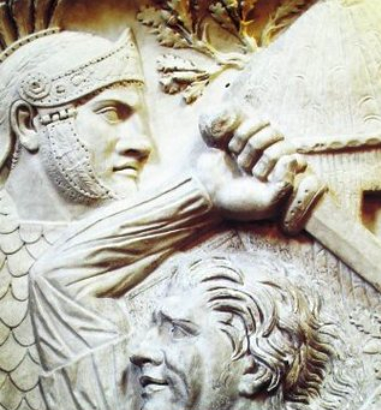
Cæsar’s Account
Cæsar has given us a careful and critical account of them as he knew them in Gaul. They were, he says, eager for battle, but easily dashed by reverses. They were extremely superstitious, submitting to their Druids in all public and private affairs, and regarding it as the worst of punishments to be excommunicated and forbidden to approach the ceremonies of religion:
“They who are thus interdicted [for refusing to obey a Druidical sentence] are reckoned in the number of the vile and wicked; all persons avoid and fly their company and discourse, lest they should receive any infection by contagion; they are not permitted to commence a suit; neither is any post entrusted to them…. The Druids are generally freed from military service, nor do they pay taxes with the rest…. Encouraged by such rewards, many of their own accord come to their schools, and are sent by their friends and relations. They are said there to get by heart a great number of verses; some continue twenty years in their education; neither is it held lawful to commit these things [the Druidic doctrines] to writing, though in almost all public transactions and private accounts they use the Greek characters.”
The Gauls were eager for news, besieging merchants and travellers for gossip, easily influenced, sanguine, credulous, fond of change, and wavering in their counsels. They were at the same time remarkably acute and intelligent, very quick to seize upon and to imitate any contrivance they found useful. Their ingenuity in baffling the novel siege apparatus of the Roman armies is specially noticed by Cæsar. Of their courage he speaks with great respect, attributing their scorn of death, in some degree at least, to their firm faith in the immortality of the soul. A people who in earlier days had again and again annihilated Roman armies, had sacked Rome, and who had more than once placed Cæsar himself in positions of the utmost anxiety and peril, were evidently no weaklings, whatever their religious beliefs or practices. Cæsar is not given to sentimental admiration of his foes, but one episode at the siege of Avaricum moves him to immortalise the valour of the defence. A wooden structure or agger had been raised by the Romans to overtop the walls, which had proved impregnable to the assaults of the battering-ram. The Gauls contrived to set this on fire. It was of the utmost moment to prevent the besiegers from extinguishing the flames, and a Gaul mounted a portion of the wall above the agger, throwing down upon it balls of tallow and pitch, which were handed up to him from within. He was soon struck down by a missile from a Roman catapult. Immediately another stepped over him as he lay, and continued his comrade’s task. He too fell, but a third instantly took his place, and a fourth; nor was this post ever deserted until the legionaries at last extinguished the flames and forced the defenders back into the town, which was finally captured on the following day.
Strabo on the Celts
The geographer and traveller Strabo, who died 24 A.D., and was therefore a little later than Cæsar, has much to tell us about the Celts. He notices that their country (in this case Gaul) is thickly inhabited and well tilled—there is no waste of natural resources. The women are prolific, and notably good mothers. He describes the men as warlike, passionate, disputatious, easily provoked, but generous and unsuspicious, and easily vanquished by stratagem. They showed themselves eager for culture, and Greek letters and science had spread rapidly among them from Massilia; public education was established in their towns. They fought better on horseback than on foot, and in Strabo’s time formed the flower of the Roman cavalry. They dwelt in great houses made of arched timbers with walls of wickerwork—no doubt plastered with clay and lime, as in Ireland—and thickly thatched. Towns of much importance were found in Gaul, and Cæsar notes the strength of their walls, built of stone and timber. Both Cæsar and Strabo agree that there was a very sharp division between the nobles and priestly or educated class on the one hand and the common people on the other, the latter being kept in strict subjection. The social division corresponds roughly, no doubt, to the race distinction between the true Celts and the aboriginal populations subdued by them. While Cæsar tells us that the Druids taught the immortality of the soul, Strabo adds that they believed in the indestructibility, which implies in some sense the divinity, of the material universe.
The Celtic warrior loved display. Everything that gave brilliance and the sense of drama to life appealed to him. His weapons were richly ornamented, his horse-trappings were wrought in bronze and enamel, of design as exquisite as any relic of Mycenean or Cretan art, his raiment was embroidered with gold. The scene of the surrender of Vercingetorix, when his heroic struggle with Rome had come to an end on the fall of Alesia, is worth recording as a typically Celtic blend of chivalry and of what appeared to the sober-minded Romans childish ostentation. When he saw that the cause was lost he summoned a tribal council, and told the assembled chiefs, whom he had led through a glorious though unsuccessful war, that he was ready to sacrifice himself for his still faithful followers—they might send his head to Cæsar if they liked, or he would voluntarily surrender himself for the sake of getting easier terms for his countrymen. The latter alternative was chosen. Vercingetorix then armed himself with his most splendid weapons, decked his horse with its richest trappings, and, after riding thrice round the Roman camp, went before Cæsar and laid at his feet the sword which was the sole remaining defence of Gallic independence. Cæsar sent him to Rome, where he lay in prison for six years, and was finally put to death when Cæsar celebrated his triumph.
But the Celtic love of splendour and of art were mixed with much barbarism. Strabo tells us how the warriors rode home from victory with the heads of fallen foemen dangling from their horses’ necks, just as in the Irish saga the Ulster hero, Cuchulain, is represented as driving back to Emania from a foray into Connacht with the heads of his enemies hanging from his chariot-rim. Their domestic arrangements were rude; they lay on the ground to sleep, sat on couches of straw, and their women worked in the fields.
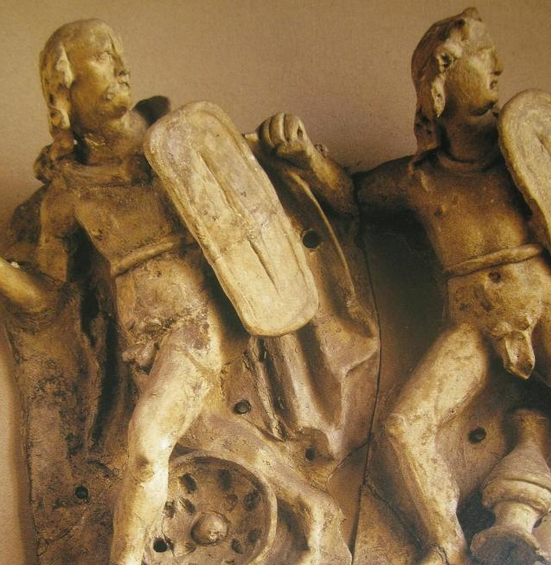
Polybius
A characteristic scene from the battle of Clastidium (222 B.C.) is recorded by Polybius. The Gæsati, he tells us, who were in the forefront of the Celtic army, stripped naked for the fight, and the sight of these warriors, with their great stature and their fair skins, on which glittered the collars and bracelets of gold so loved as an adornment by all the Celts, filled the Roman legionaries with awe. Yet when the day was over those golden ornaments went in cartloads to deck the Capitol of Rome; and the final comment of Polybius on the character of the Celts is that they, “I say not usually, but always, in everything they attempt, are driven headlong by their passions, and never submit to the laws of reason.” As might be expected, the chastity for which the Germans were noted was never, until recent times, a Celtic characteristic.
Diodorus
Diodorus Siculus, a contemporary of Julius Cæsar and Augustus, who had travelled in Gaul, confirms in the main the accounts of Cæsar and Strabo, but adds some interesting details. He notes in particular the Gallic love of gold. Even cuirasses were made of it. This is also a very notable trait in Celtic Ireland, where an astonishing number of prehistoric gold relics have been found, while many more, now lost, are known to have existed. The temples and sacred places, say Posidonius and Diodorus, were full of unguarded offerings of gold, which no one ever touched. He mentions the great reverence paid to the bards, and, like Cato, notices something peculiar about the kind of speech which the educated Gauls cultivated: “they are not a talkative people, and are fond of expressing themselves in enigmas, so that the hearer has to divine the most part of what they would say.” This exactly answers to the literary language of ancient Ireland, which is curt and allusive to a degree. The Druid was regarded as the prescribed intermediary between God and man—no one could perform a religious act without his assistance.
Ammianus Marcellinus
Ammianus Marcellinus, who wrote much later, in the latter half of the fourth century A.D., had also visited Gaul, which was then, of course, much Romanised. He tells us, however, like former writers, of the great stature, fairness, and arrogant bearing of the Gallic warrior. He adds that the people, especially in Aquitaine, were singularly clean and proper in their persons—no one was to be seen in rags. The Gallic woman he describes as very tall, blue-eyed, and singularly beautiful; but a certain amount of awe is mingled with his evident admiration, for he tells us that while it was dangerous enough to get into a fight with a Gallic man, your case was indeed desperate if his wife with her “huge snowy arms,” which could strike like catapults, came to his assistance. One is irresistibly reminded of the gallery of vigorous, independent, fiery-hearted women, like Maeve, Grania, Findabair, Deirdre, and the historic Boadicea, who figure in the myths and in the history of the British Islands.
Rice Holmes on the Gauls
The following passage from Dr. Rice Holmes’ “Cæsar’s Conquest of Gaul” may be taken as an admirable summary of the social physiognomy of that part of Celtica a little before the time of the Christian era, and it corresponds closely to all that is known of the native Irish civilisation:
“The Gallic peoples had risen far above the condition of savages; and the Celticans of the interior, many of whom had already fallen under Roman influence, had attained a certain degree of civilisation, and even of luxury. Their trousers, from which the province took its name of Gallia Bracata, and their many-coloured tartan skirts and cloaks excited the astonishment of their conquerors. The chiefs wore rings and bracelets and necklaces of gold; and when these tall, fair-haired warriors rode forth to battle, with their helmets wrought in the shape of some fierce beast’s head, and surmounted by nodding plumes, their chain armour, their long bucklers and their huge clanking swords, they made a splendid show. Walled towns or large villages, the strongholds of the various tribes, were conspicuous on numerous hills. The plains were dotted by scores of oper hamlets. The houses, built of timber and wickerwork, were large and well thatched. The fields in summer were yellow with corn. Roads ran from town to town. Rude bridges spanned the rivers; and barges laden with merchandise floated along them. Ships clumsy indeed but larger than any that were seen on the Mediterranean, braved the storms of the Bay of Biscay and carried cargoes between the ports of Brittany and the coast of Britain. Tolls were exacted on the goods which were transported on the great waterways; and it was from the farming of these dues that the nobles derived a large part of their wealth. Every tribe had its coinage; and the knowledge of writing in Greek and Roman characters was not confined to the priests. The Æduans were familiar with the plating of copper and of tin. The miners of Aquitaine, of Auvergne, and of the Berri were celebrated for their skill. Indeed, in all that belonged to outward prosperity the peoples of Gaul had made great strides since their kinsmen first came into contact with Rome.”
Weakness of the Celtic Policy
Yet this native Celtic civilisation, in many respects so attractive and so promising, had evidently some defect or disability which prevented the Celtic peoples from holding their own either against the ancient civilisation of the Græco-Roman world, or against the rude young vigour of the Teutonic races. Let us consider what this was.
The Classical State
At the root of the success of classical nations lay the conception of the civic community, the πόλις, the res publica, as a kind of divine entity, the foundation of blessing to men, venerable for its age, yet renewed in youth with every generation; a power which a man might joyfully serve, knowing that even if not remembered in its records his faithful service would outlive his own petty life and go to exalt the life of his motherland or city for all future time. In this spirit Socrates, when urged to evade his death sentence by taking the means of escape from prison which his friends offered him, rebuked them for inciting him to an impious violation of his country’s laws. For a man’s country, he says, is more holy and venerable than father or mother, and he must quietly obey the laws, to which he has assented by living under them all his life, or incur the just wrath of their great Brethren, the Laws of the Underworld, before whom, in the end, he must answer for his conduct on earth. In a greater or less degree this exalted conception of the State formed the practical religion of every man among the classical nations of antiquity, and gave to the State its cohesive power, its capability of endurance and of progress.
Teutonic Loyalty
With the Teuton the cohesive force was supplied by another motive, one which was destined to mingle with the civic motive and to form, in union with it—and often in predominance over it—the main political factor in the development of the European nations. This was the sentiment of what the Germans called Treue, the personal fidelity to a chief, which in very early times extended itself to a royal dynasty, a sentiment rooted profoundly in the Teutonic nature, and one which has never been surpassed by any other human impulse as the source of heroic self-sacrifice.
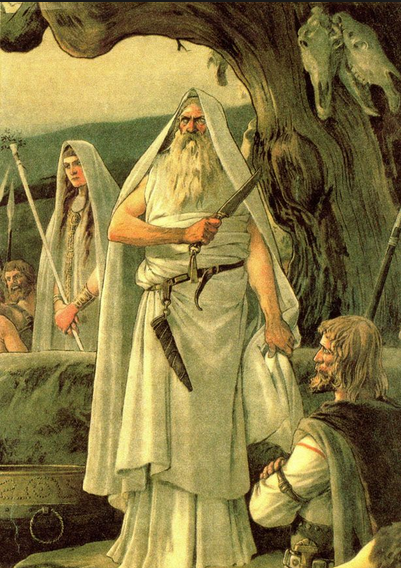
Celtic Religion
No human influences are ever found pure and unmixed. The sentiment of personal fidelity was not unknown to the classical nations. The sentiment of civic patriotism, though of slow growth among the Teutonic races, did eventually establish itself there. Neither sentiment was unknown to the Celt, but there was another force which, in his case, overshadowed and dwarfed them, and supplied what it could of the political inspiration and unifying power which the classical nations got from patriotism and the Teutons from loyalty. This was Religion; or perhaps it would be more accurate to say Sacerdotalism—religion codified in dogma and administered by a priestly caste. The Druids, as we have seen from Cæsar, whose observations are entirely confirmed by Strabo and by references in Irish legends, were the really sovran power in Celtica. All affairs, public and private, were subject to their authority, and the penalties which they could inflict for any assertion of lay independence, though resting for their efficacy, like the mediæval interdicts of the Catholic Church, on popular superstition alone, were enough to quell the proudest spirit. Here lay the real weakness of the Celtic polity. There is perhaps no law written more conspicuously in the teachings of history than that nations who are ruled by priests drawing their authority from supernatural sanctions are, just in the measure that they are so ruled, incapable of true national progress. The free, healthy current of secular life and thought is, in the very nature of things, incompatible with priestly rule. Be the creed what it may, Druidism, Islam, Judaism, Christianity, or fetishism, a priestly caste claiming authority in temporal affairs by virtue of extra-temporal sanctions is inevitably the enemy of that spirit of criticism, of that influx of new ideas, of that growth of secular thought, of human and rational authority, which are the elementary conditions of national development.
The Cursing of Tara
A singular and very cogent illustration of this truth can be drawn from the history of the early Celtic world. In the sixth century A.D., a little over a hundred years after the preaching of Christianity by St. Patrick, a king named Dermot MacKerval ruled in Ireland. He was the Ard Righ, or High King, of that country, whose seat of government was at Tara, in Meath, and whose office, with its nominal and legal superiority to the five provincial kings, represented the impulse which was moving the Irish people towards a true national unity. The first condition of such a unity was evidently the establishment of an effective central authority. Such an authority, as we have said, the High King, in theory, represented. Now it happened that one of his officers was murdered in the discharge of his duty by a chief named Hugh Guairy. Guairy was the brother of a bishop who was related by fosterage to St. Ruadan of Lorrha, and when King Dermot sent to arrest the murderer these clergy found him a hiding-place. Dermot, however, caused a search to be made, haled him forth from under the roof of St. Ruadan, and brought him to Tara for trial. Immediately the ecclesiastics of Ireland made common cause against the lay ruler who had dared to execute justice on a criminal under clerical protection. They assembled at Tara, fasted against the king, and laid their solemn malediction upon him and the seat of his government. Then the chronicler tells us that Dermot’s wife had a prophetic dream:
“Upon Tara’s green was a vast and wide-foliaged tree, and eleven slaves hewing at it; but every chip that they knocked from it would return into its place again and there adhere instantly, till at last there came one man that dealt the tree but a stroke, and with that single cut laid it low.”
The fair tree was the Irish monarchy, the twelve hewers were the twelve Saints or Apostles of Ireland, and the one who laid it low was St. Ruadan. The plea of the king for his country, whose fate he saw to be hanging in the balance, is recorded with moving force and insight by the Irish chronicler:
“ ‘Alas,’ he said, ‘for the iniquitous contest that ye have waged against me; seeing that it is Ireland’s good that I pursue, and to preserve her discipline and royal right; but ’tis Ireland’s unpeace and murderousness that ye endeavour after.’ ”
But Ruadan said, “Desolate be Tara for ever and ever”; and the popular awe of the ecclesiastical malediction prevailed. The criminal was surrendered, Tara was abandoned, and, except for a brief space when a strong usurper, Brian Boru, fought his way to power, Ireland knew no effective secular government till it was imposed upon her by a conqueror. The last words of the historical tract from which we quote are Dermot’s cry of despair:
“Woe to him that with the clergy of the churches battle joins.”
This remarkable incident has been described at some length because it is typical of a factor whose profound influence in moulding the history of the Celtic peoples we can trace through a succession of critical events from the time of Julius Caesar to the present day. How and whence it arose we shall consider later; here it is enough to call attention to it. It is a factor which forbade the national development of the Celts, in the sense in which we can speak of that of the classical or the Teutonic peoples.
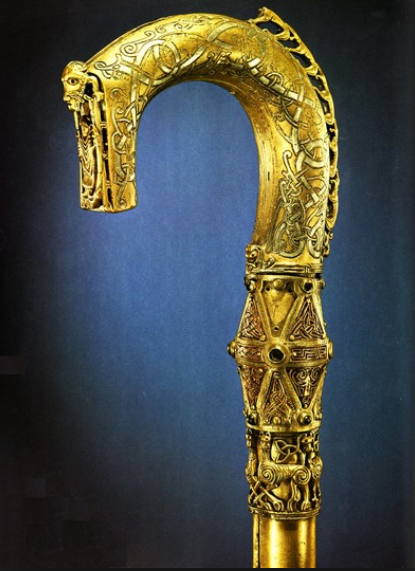
What Europe Owes to the Celt
Yet to suppose that on this account the Celt was not a force of any real consequence in Europe would be altogether a mistake. His contribution to the culture of the Western world was a very notable one. For some four centuries—about A.D. 500 to 900—Ireland was the refuge of learning and the source of literary and philosophic culture for half Europe. The verse-forms of Celtic poetry have probably played the main part in determining the structure of all modern verse. The myths and legends of the Gaelic and Cymric peoples kindled the imagination of a host of Continental poets. True, the Celt did not himself create any great architectural work of literature, just as he did not create a stable or imposing national polity. His thinking and feeling were essentially lyrical and concrete. Each object or aspect of life impressed him vividly and stirred him profoundly; he was sensitive, impressionable to the last degree, but did not see things in their larger and more far-reaching relations. He had little gift for the establishment of institutions, for the service of principles; but he was, and is, an indispensable and never-failing assertor of humanity as against the tyranny of principles, the coldness and barrenness of institutions. The institutions of royalty and of civic patriotism are both very capable of being fossilised into barren formulae, and thus of fettering instead of inspiring the soul. But the Celt has always been a rebel against anything that has not in it the breath of life, against any unspiritual and purely external form of domination. It is too true that he has been over-eager to enjoy the fine fruits of life without the long and patient preparation for the harvest, but he has done and will still do infinite service to the modern world in insisting that the true fruit of life is a spiritual reality, never without pain and loss to be obscured or forgotten amid the vast mechanism of a material civilisation.

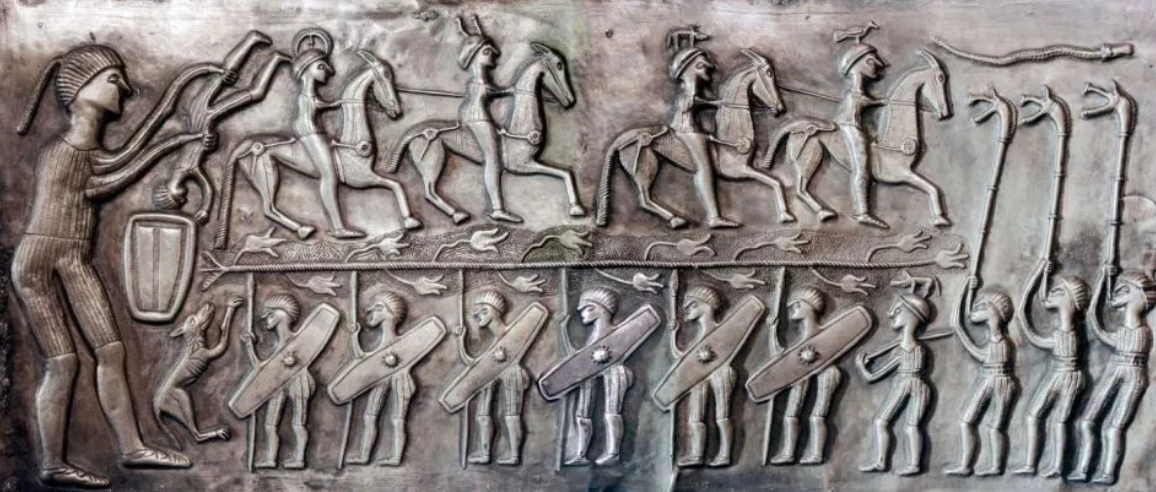

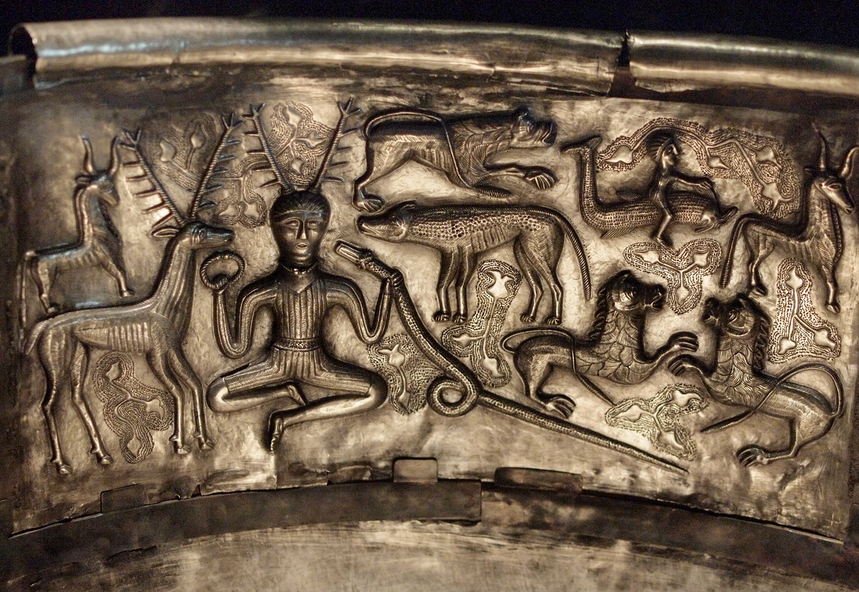
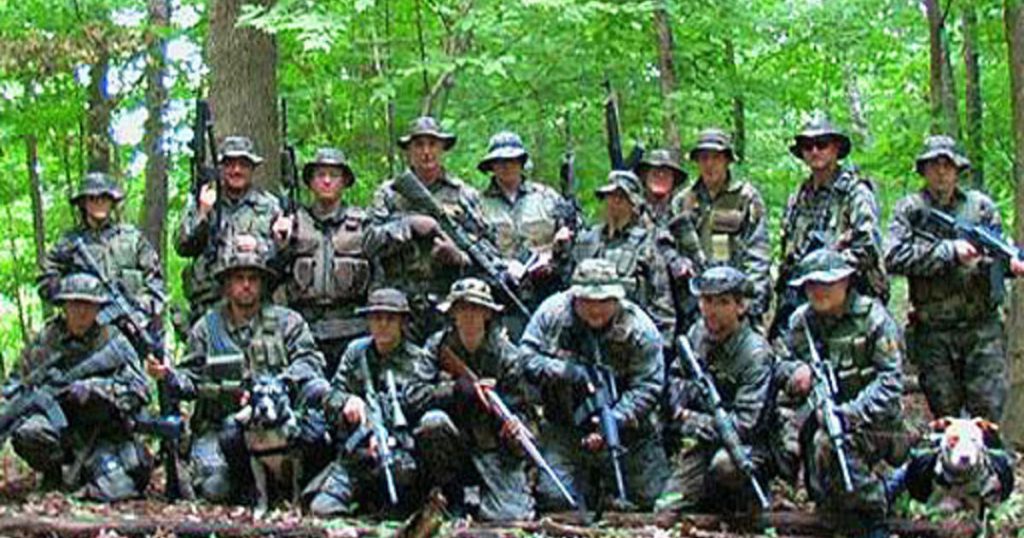





5